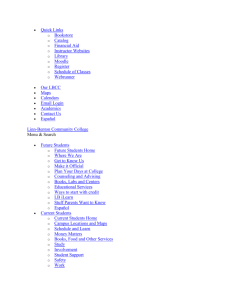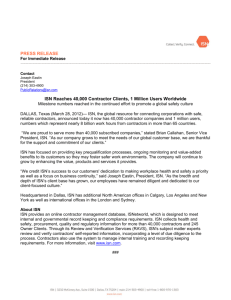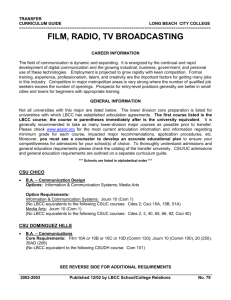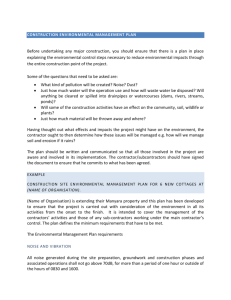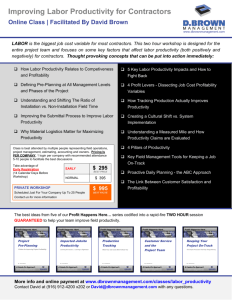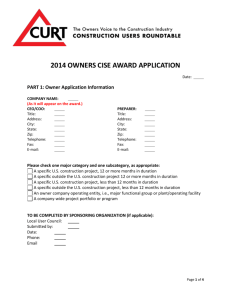Contractor Health and Safety Compliance Linn Benton Community
advertisement
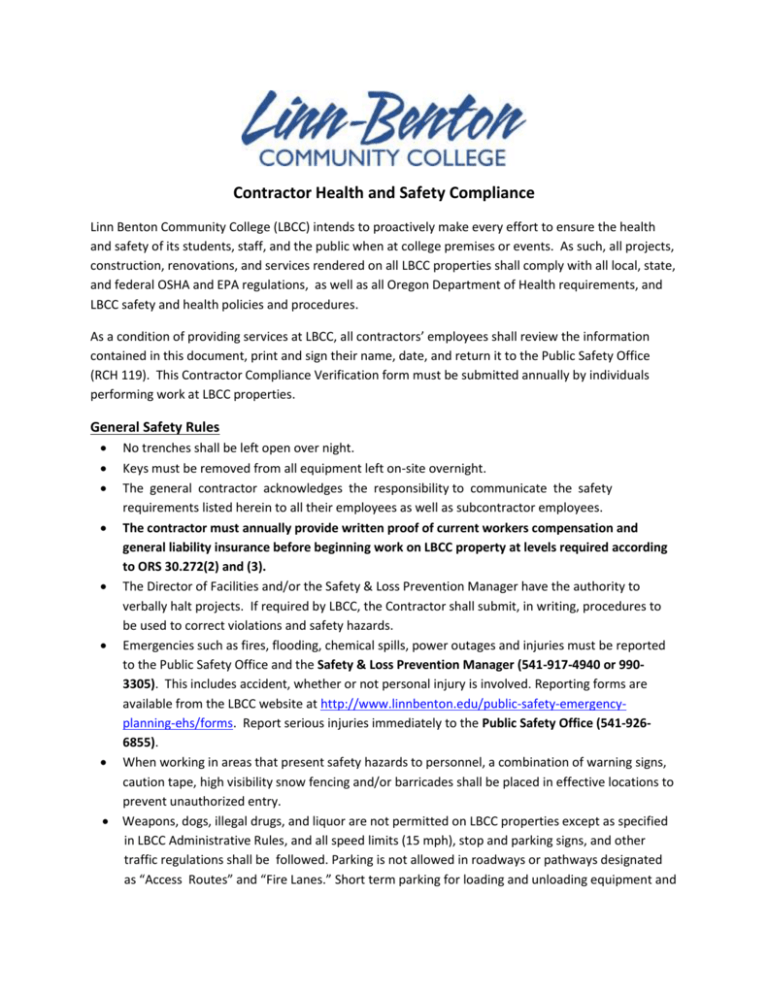
Contractor Health and Safety Compliance Linn Benton Community College (LBCC) intends to proactively make every effort to ensure the health and safety of its students, staff, and the public when at college premises or events. As such, all projects, construction, renovations, and services rendered on all LBCC properties shall comply with all local, state, and federal OSHA and EPA regulations, as well as all Oregon Department of Health requirements, and LBCC safety and health policies and procedures. As a condition of providing services at LBCC, all contractors’ employees shall review the information contained in this document, print and sign their name, date, and return it to the Public Safety Office (RCH 119). This Contractor Compliance Verification form must be submitted annually by individuals performing work at LBCC properties. General Safety Rules No trenches shall be left open over night. Keys must be removed from all equipment left on-site overnight. The general contractor acknowledges the responsibility to communicate the safety requirements listed herein to all their employees as well as subcontractor employees. The contractor must annually provide written proof of current workers compensation and general liability insurance before beginning work on LBCC property at levels required according to ORS 30.272(2) and (3). The Director of Facilities and/or the Safety & Loss Prevention Manager have the authority to verbally halt projects. If required by LBCC, the Contractor shall submit, in writing, procedures to be used to correct violations and safety hazards. Emergencies such as fires, flooding, chemical spills, power outages and injuries must be reported to the Public Safety Office and the Safety & Loss Prevention Manager (541-917-4940 or 9903305). This includes accident, whether or not personal injury is involved. Reporting forms are available from the LBCC website at http://www.linnbenton.edu/public-safety-emergencyplanning-ehs/forms. Report serious injuries immediately to the Public Safety Office (541-9266855). When working in areas that present safety hazards to personnel, a combination of warning signs, caution tape, high visibility snow fencing and/or barricades shall be placed in effective locations to prevent unauthorized entry. Weapons, dogs, illegal drugs, and liquor are not permitted on LBCC properties except as specified in LBCC Administrative Rules, and all speed limits (15 mph), stop and parking signs, and other traffic regulations shall be followed. Parking is not allowed in roadways or pathways designated as “Access Routes” and “Fire Lanes.” Short term parking for loading and unloading equipment and materials only is permitted, provided the vehicle is not left unattended." Vehicles left in designated fire lanes or restricted parking areas will be fined and/or towed. Harassment of any LBCC employee, student, faculty member, or visitor by contractors will not be tolerated. LBCC strictly prohibits sexual harassment and harassment of any kind in the workplace. LBCC will not tolerate unlawful discrimination, including harassment based on sex, sexual orientation, race, religion, national origin, disability, and other forms of legally impermissible harassment. Emergency Procedures - All personnel shall read the current LBCC Emergency Procedures brochure and be prepared to stop work and respond appropriately based on the emergency. Smoking is not permitted on any Linn Benton Community College property outside of designated smoking areas. Horseplay or other unsafe acts are prohibited. General Housekeeping Rules Aisles, doors, fire extinguishers, eyewash stations, stairways, and other emergency-type equipment shall be kept clear, operational, and readily accessible at all times. Nails and screws protruding from boards, floors and walls must be removed. Combustible scrap material (wood, paper, cardboard, loose stock, etc.) accumulating inside a building shall either be removed daily or placed in a metal container with a tight cover at the end of each workday. The contractor shall provide for the collection, segregation, and legal disposal of all hazardous and general waste in compliance with OSHA, EPA, OR DEQ and/or DOT standards. All walking surfaces shall be free of splinters, nails, or other protrusions, which may cause injury. The work area must be kept as clean as possible at all times. Upon project completion, the contractor shall remove excess materials (not designated as back stock), loose stock, scrap, paints, mastics, cleaning compounds and chemicals from the LBCC campus. Dust control measures should be used at all times to prevent dust, particulates, welding fumes, smoke, odors and debris from dispersing into the occupied areas outside the work area. This includes the use of airtight dust barriers, exhaust fans and HEPA- filtered power tools and equipment. Waste oils, light tubes and ballasts shall be carefully collected and stored at a location designated by the Safety & Loss Prevention Manager for recycling by the Contractor upon completion of the project. Training Documentation OSHA training – Upon request, Contractors shall provide documentation of OSHA training completed. Permits – Contractors shall obtain and submit documentation of all required Federal, State and local permits, applications, licenses, as requested/required. Material Safety Data Sheets/ Safety Data Sheets (MSDS/SDS) – Contractors shall maintain on site material safety data sheets (Safety Data Sheets under the revised GHS standards) for chemicals, gases and other products used on-site. Health & Safety [see http://www.linnbenton.edu/public-safety-emergency-planning-ehs/safety-plans] Tools -All hand tools and related equipment shall be maintained in a safe condition. All gang boxes shall be kept secured when not in use. Equipment should be labeled as to its owner. Any unsafe equipment shall be red tagged and removed from service immediately. Hot work - Hot Work Permits shall be obtained before the start of any Hot Work such as sawing, cutting, welding, brazing, and/or the use of internal combustion engines, etc. Contractors shall coordinate and schedule all required fire watches. Contractor’s employees shall be trained and competent in the use of fire extinguishers. Proper exhaust ventilation, filtering of welding fumes and safety fire curtains shall be utilized in welding areas. Contractors shall not disrupt normal building operations and functions during welding operations. Permits may be obtained by contacting the Safety & Loss Prevention Manager (541-917-4940 or 990-3305). Fall Protection - Fall protection shall be required whenever employees are working at elevated heights of 10 feet or more and/or where guardrails are not in use in accordance with OSHA regulations. This includes being tied off when working from extendable/articulating boom lifts, and many other aerial work platforms. Toe boards will be installed on all elevated work platforms. Asbestos - All new building products, furnishings, and construction materials shall be free from asbestos. The lead contractor and LBCC Facilities Director must verify all materials do not contain asbestos PRIOR to work. Prior to any renovation, construction, or related work, work activities shall be approved in areas that may contain asbestos. Suspect and confirmed asbestos-containing materials and lead-based paint shall not be damaged. If suspect asbestos is encountered during work, the contractor will cease work immediately and contact the Facilities Director and Safety & Loss Prevention Manager. Only licensed personnel shall perform sampling and subsequent removal of asbestos containing material. Confined Spaces - Non-Permit Required Confined Spaces require notification to your supervisor or Linn Benton Community College liaison prior to entry. If atmosphere changing activities are performed such as painting, welding, brazing, etc. a permit will be required. Prior to entering any PERMIT REQUIRED CONFINED SPACE, contact the Safety & Loss Prevention Manager (541-917-4940 or 990-3305). Equipment Operation - Only qualified trained employees shall operate equipment such as forklifts, cranes, lifts, tractors, bobcats, etc and must do so in accordance to OSHA standards. Personal safety harnesses must be worn while in bucket aerial lifts. Contractor or equipment operator must provide proof of training to the Facilities Director or the Safety & Loss Prevention Manager before start of project or when requested. Ladders and Scaffolds – Contractors must furnish OSHA compliant ladders for use by their employees and they must be used in accordance with OSHA standards and manufacturer’s guidelines. The use of broken or faulty ladders is prohibited. Only fiberglass or wood ladders shall be used in and around electrical equipment or in the vicinity of exposed electrical conductors. Scaffolds and rolling staging shall be installed, maintained, and used in compliance with OSHA standards. Personal Protective Equipment (PPE) - Contractors and their sub-contractors shall be responsible for any required personal protective equipment. Employees shall be required to wear their designated PPE. Hardhats shall be worn during all phases of new construction and renovation by all personnel in areas where potential overhead hazards exist or work is performed, eye protection worn for any operations creating possible eye hazard, hearing protection worn during mechanical operations exceeding allowable dBA threshold, and dust masks and respirators as appropriate. Lockout/Tagout & Electrical Safety - All equipment shall be de-energized and locked out using approved devices. The college project manager will always be notified, in advance, of any lockout of electrical circuits or other sources of energy that may impact the campus operation. Electrical rooms/vaults and breaker panels shall be secured at all times during electrical work. Electrical rooms and vaults shall not be used for storage purposes. Contractors must be able to show proof of training for compliance with NFPA 70E Article 130 when working on an open electrical panel carrying voltage >50 volts. Ground Fault Circuit Interrupters (GFCI) shall be utilized where required by the National Electric Code or where prudent practice would deem their use appropriate. Utilities Location - The contractor shall complete a location of utilities prior to the start of any digging, excavation, trenching, drilling, driving posts, or any other type of earth disruption. Excavation and trenching shall comply with all applicable regulations. The contractor is responsible for providing a Competent Person at every excavation site that: Evaluates soil conditions Constructs protective systems in and around excavation site Tests atmospheric conditions Provides safe ingress and egress for excavation Inspects the site daily before each shift, as needed throughout shifts, following a rainstorm or other hazard creating event (i.e. vehicles or other equipment nearing edges of excavation) Campus Laboratories - The laboratories on our campus are valuable resources. They use hazardous materials, use expensive equipment and instrumentation, and require controlled environments. Labs may contain potential hazards; radiological, biochemical, chemical, physical, electrical, and other hazards that may not be readily apparent. To work safely and comply with Hazard Communication requirements all contractors must work with the college Facilities Director or Safety & Loss Prevention Manager to obtain prior approval. Hazards, areas of concern, specific training and/or procedures, and the personal protective equipment (PPE) requirements must be communicated. Visitors must be constantly aware of these unique hazards when entering, working, and, leaving these spaces, and follow any specific instruction and all safety requirements provided by the lab’s responsible person(s). When a contractor requires an emergency entrance into one of the laboratories, the contracting individual shall contact the Public Safety Officer On Duty - 541-926-6855. Be sure to report all incidents or accidents immediately to Public Safety. Haz-Com Standards - Contractors must submit a chemical inventory to Safety & Loss Prevention (Public Safety), with quantities of any hazardous materials to be used. All chemicals and hazardous substances shall be labeled as to their contents. An MSDS/SDS shall be available for all hazardous substances on the premises, and copies forwarded to the Safety & Loss Prevention/Public Safety Department (RCH 119). The Safety & Loss Prevention Manager shall review and approve all MSDS’s prior to work. Substances such as asbestos, lead, mercury, formaldehyde, etc. are strictly prohibited. Fire Alarms and Sprinkler Systems- Fire alarms and sprinkler systems are to remain operational at sites where the building remains occupied. In the event the system must be deactivated, is damaged, or altered, the contactor shall notify the Facilities Director (541-917-4722 or 974-0885) or Safety & Loss Prevention Manager (541-917-4940 or 990-3305) immediately. Should there be need for a sprinkler system to be deactivated, LBCC personnel must implement the Red Tag Sprinkler program. Fire walls and smoke partitions cannot be breached. Any penetrations of such must be approved by the Facilities Director and must be sealed when work is complete. Environmental Protection All hazardous material storage must be in secondary containment devices. All unused hazardous material must be taken offsite by the contractor at the conclusion of the project. All regulated waste generated as a result of the project (i.e. fluorescent lights, PCB, asbestos, lead and/or mercury containing waste, etc…) must be managed in accordance with applicable local, state and federal requirements and as approved by the Safety & Loss Prevention Manager Discharges to the sanitary or storm sewer must have prior approval of the Facilities Director. For projects disturbing one or more acre of land, contractors must have an approved Storm Water Pollution Prevention Plan and coverage under the Massachusetts NPDES general permit for storm water discharges associated with construction activity. Any project that required shutting off the drinking water system in any manner or any interruption of utilities must be communicated to and coordinated with the Facilities Director (541-917-4722 or 974-0885) or Safety & Loss Prevention Manager (541-917-4940 or 990-3305) before work is initiated and proper disinfection and sampling administered if required. Physical Security All employees of contractors who will be working in non-public areas and independent of an LBCC employee escort must receive and wear, while on campus properties, a LBCC identification badge. Badges are obtained through the Public Safety Office(RCH 119); or, at the Benton or Lebanon Centers, the Administrative Office. Access to locked areas may be provided by a facilities employee, a Public Safety Officer (541926-6855), or by checking out a vendor key from the Public Safety Office (RCH 119) if approved by the Facilities Director. I UNDERSTAND THAT NON-COMPLIANCE WITH ANY OF THESE SAFETY RELATED ELEMENTS WILL LEAD TO A CESATION OF WORK UNTIL RECTIFIED, OR, TERMINATION OF THE CONTRACT, AND I AGREE TO COMPLY WITH ALL OSHA & EPA REGULATIONS, REQUIRED SAFETY TRAINING, AND LINN BENTON COMMUNITY COLLEGE POLICIES. Contracting Company responsible for the work and employees: _____________________________ Name of “Company” employee performing work: _________________________________________ Signature of “Company” employee performing work: ______________________________________ Date signed: ____/____/__________ Signature of Responsible LBCC Employee: ______________________________________________ Date signed: ____/____/__________
